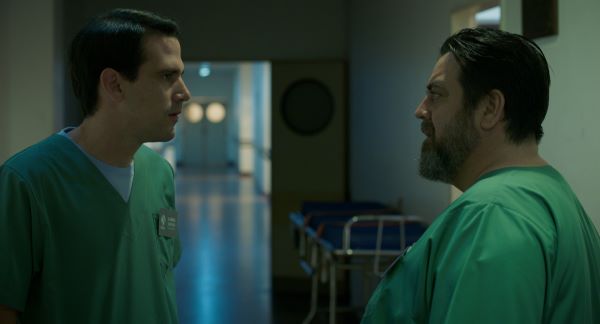

La Dosis is an Argentinian thriller that burns very slowly, all to the film’s benefit, as it really gives viewers time to explore the main characters.
Marcos (Carlos Portaluppi), an intensive care nurse, has been in the same unit in the same hospital for 20 years. He hasn’t even taken a vacation day in seven years. He is greatly admired by his colleagues, but he is a loner. By now, they know not to invite him to a colleague’s birthday celebration; they know he won’t come. The only person he has a real connection with is fellow nurse Noelia (Lorena Vega). And with his patients. He is tremendously compassionate toward them, sometimes soothing or admonishing them if they, say, try to sneak a smoke in the men’s bathroom. That compassion extends to occasionally moving his patients along to the other side if he feels they are terminal and suffering needlessly.
We meet Marcos just as his significant other has left—he comes home one day to find empty closets and a note on the table. So, this quiet introvert, who likes things just as they are, is already shaken when a new nurse, Gabriel (Ignacio Rogers), arrives and unmoors him even more. Gabriel is young, eager, and gregarious. He immediately ingratiates himself to everyone on the ward. Even Marcos eventually develops a grudging friendship with him, but something bugs him about the newbie. Something does not seem quite aboveboard to Marcos, and this is where the film becomes fun.
Gabriel claims he admires Marcos, as though he’s looking for a mentor, yet he throws off Marcos’s equilibrium. Gabriel constantly offers him rides home and confides to the reserved Marcos that his mother was a nurse and how her stories inspired him. He may be the one person who can actually bring Marcos out of his shell and his obvious depression. However, in the ICU, there appears to be an alarming increase of deaths. This uptick begins just as one patient claims to recognize Gabriel from another hospital.
Writer/director Martín Kraut teases his clues out unhurriedly and ratchets up the suspense in infinitesimal doses. The heart of the film lies with Portaluppi’s fairly astounding performance as a man whose main sustenance are cans of uncooked peas and who has no pleasure in his life, save for his job. Marcos never raises his voice, never walks faster or slower than his normal gait. He appears to all like an unflappable, solid presence. As his suspicions about Gabriel increase, he becomes less and less so, and much is revealed in his close-ups. (Portaluppi is a master of understatement.) Marcos constantly masks his emotions, but one of the hardest to disguise is fear, and that is exactly what he needs to do to survive.
The relationship between Marcos and Gabriel (Rogers is excellent) is also worth examining. Gabriel undermines the older nurse’s authority through his geniality. No one is really nice to Marcos because he’s unapproachable, yet Gabriel is unrelenting. One of the main themes that comes up between the two is a power struggle: Gabriel is the young buck taking down the alpha of the herd. Adding to that is a distinct homoerotic subtext. We never see the person who no longer lives with Marcos, but when Gabriel takes Marcos to a bar and Marcos watches two men kissing, he becomes distinctly uncomfortable. It leaves open many questions, whether Marcos is attracted to Gabriel or uncomfortable with his own homosexuality or any public display of affection.
Props also to the production team in creating a hospital where absolutely no one would ever want to be treated. For anything. This is the most depressing hospital since Lars von Trier’s The Kingdom.
















Leave A Comment